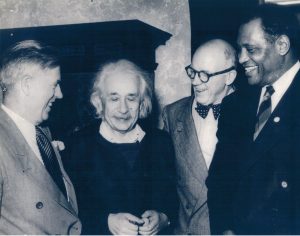Frank Kingdon
 Frank Kingdon was an English-born American journalist, activist, and academic administrator. Kingdon was the first chairman of the Emergency Rescue Committee, which rescued approximately 2,000 people from the Holocaust. He also served as president of Dana College and the University of Newark (now Rutgers). Kingdon was also a civil rights advocate, columnist for the New York Post, a minister, radio commentator, and co-chair of the Progressive Citizens of America.
Frank Kingdon was an English-born American journalist, activist, and academic administrator. Kingdon was the first chairman of the Emergency Rescue Committee, which rescued approximately 2,000 people from the Holocaust. He also served as president of Dana College and the University of Newark (now Rutgers). Kingdon was also a civil rights advocate, columnist for the New York Post, a minister, radio commentator, and co-chair of the Progressive Citizens of America.He came alone to the United States in 1912 as a youth of seventeen and was ordained a minister of the Methodist Church. Four years later he transferred to the pastorate of Hull, Massachusetts,. This transfer made it possible for him to continue his education. During his pastorates in Hull, East Weymouth, and Boston, he earned his A.B. degree from Boston University, and won a Jacob Sleeper Fellowship at Harvard working in philosophy and religion. In 1925 he accepted the pastorate of the Central Church, Lansing, Michigan. While in Michigan he did graduate work in social psychology at Michigan State College, and received a degree of D.D. from Albion College.
In 1922 Kingdon became the pastor of Calvary Church in East Orange, New Jersey. He resigned from this pastorate in October 1934 to accept the Presidency of Dana College, Newark, which was later merged with other Newark institutions to form the University of Newark. Kingdon became the first President of the University. He was the Campaign Chairman of the Newark Community Chest and President of the Newark Welfare Federation for three years. Kingdon resigned from the Presidency of the University of Newark in June, 1940 to devote himself to interpreting democracy and to assist all agencies at work in the United States to safeguard against anti-democratic forces.
During World War II he served as the first Chairman of the Emergency Rescue Committee raising funds that sent Varian Fry into NAZI controlled Vichy France helping rescue between two and four thousand anti-NAZI and Jewish refugees from the Holocaust. He also served as Special Consultant in the Office of Civilian Defense during the period of its organization, a member of the Executive Committee of the United States Committee for the Care of European Children, and Chairman of the Executive Committee of the Committee for Refugee Education in New York City. He has been a special lecturer at Town Hall, New York, at the Institute of Public Affairs' of the University of Virginia, and the Williamstown Institute of Human Relations. Frank Kingdon was a well-known radio commentator in the 1930s and 1940s with a daily program of news-comment at WMCA (AM).
Following World War II and the abandonment of equal rights advocate Henry Wallace on the 1944 Presidential ticket in favor of known racist and pro-segregationist Harry S. Truman. Kingdon left the Democratic party and served as Co-Chair of the Progressive Citizens of America. Kingdon left the group in 1947 because he felt a third-party race for President by Henry Wallace would prove futile. In the late 1950's with Michael Gore, he started a publication called the American Salesman, a digest-type magazine with ideas and techniques on selling, advertising, promoting, marketing, and merchandizing.
He also authored several books including “Humane Religion,” 1930; “When Half Gods Go,” 1933; Jersey Joads: the Story of the Cranberry Case (1940); “Life of John Cotton Dana,’ 1940; “1776 and Today,” 1941; “Our Second War of Independence,” 1942; “Jacob's Ladder,” 1943; “That Man in the White House,” 1944; “An Uncommon Man: Or, Henry Wallace and 60 Million Jobs,” 1945, and "Architects of the Republic," 1947. Provided by Wikipedia

